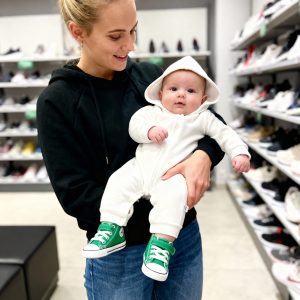My mornings usually unfold at their own pace. Steam rising from my chipped blue mug, the one I refuse to replace despite its obvious flaws. Sunlight filters through our kitchen blinds, casting patterns across the marble island. Nathan had already rushed off to court, leaving behind the lingering scent of cologne and an unfinished piece of toast. I was mindlessly browsing social media when a video caught my attention—a champagne toast aboard an elegant vessel, my nephew’s girlfriend giggling as glasses clinked together. The text overlay read: “Annual sailing adventure begins! Family memories in the making.”
My finger stopped scrolling. The yearly family cruise. A Whitmore clan ritual spanning decades, though I’d been welcomed aboard precisely twice since becoming Nathan’s wife. During my first invitation, I’d foolishly suggested mixing up the itinerary. The second time, Cassandra—Nathan’s sister—made it crystal clear I was a visitor, not kin. I dove deeper into the posts, recognizing familiar faces. Elena’s forced grin. Her partner, Marcus. Dorothy, my mother-in-law, clutching a bellini. Nathan’s cousin with his new girlfriend. Everyone but me.
There used to be a family group message called “Whitmore Wave Riders.” Nathan had included me initially, then quietly removed me following some drama over dinner arrangements. Ancient history. I checked my phone anyway—no thread, no notifications, zero correspondence about the voyage. I sat there staring at my screen, coffee growing cold. My heartbeat wasn’t frantic, exactly. It was something more unsettling. A hollow certainty that this omission wasn’t accidental. It was calculated.
Later that day, while loading dishes into the washer, my phone chimed with a text from Cassandra. Except it wasn’t intended for me—it was a screenshot she’d sent by mistake. A photo showing finalized room assignments titled “Starboard Accommodations.” A name had been struck through. Mine. Beside it read “Reserved for Sienna.” Sienna, Cassandra’s pilates instructor. The woman who’d once questioned whether I was Nathan’s personal secretary. The next message was an audio clip of Cassandra mid-giggle: “At least the vibe won’t be so suffocating this time around.”
Suffocating. I placed my phone face-down without replying. My hands remained steady, though my teeth were clenched tight enough to ache.
During dinner, I waited before bringing it up. Nathan was preoccupied, checking market updates between bites of grilled chicken. “I see your family’s organizing another sailing trip,” I mentioned casually.
He looked up briefly. “Right, Mom brought it up recently. I think they’re still sorting out who’s coming.”
I cocked my head. “Am I included?”
His brow furrowed as he set down his utensils. “Obviously. Why would you ask that?”
I smiled just enough to keep things civil. “Just wondering.” He returned to his phone. “I’ll confirm,” he muttered. He wouldn’t. He never followed through.
Following dinner, I hand-washed every dish, taking my time with each piece. It’s remarkable how quiet can communicate more than yelling ever could. That evening, I stared at our bedroom ceiling fan spinning endlessly overhead. My thoughts kept circling back to every instance of subtle exclusion. Holiday parties I learned about through social posts, lunch dates revealed in tagged photos, hushed conversations that ceased when I appeared. I wasn’t innocent—I hadn’t expected warmth from Cassandra. But this crossed a line. The cruelest part? Nobody would acknowledge it openly. They didn’t need to. Eventually you stop wondering why you’re left out. You start questioning why you kept trying to fit in. Before switching off my lamp, I grabbed my notebook and wrote a single line in careful script: Observe. Stay calm. Not yet.
Morning brought a message from Cassandra, one of those texts that seemed friendly on the surface but sliced deep if you looked closer. “Hi Meredith! Just noticed we might have forgotten to book you a cabin on the yacht. Complete accident on my part! Everything filled up faster than usual this year. My apologies! Let’s connect afterward.”
There it was—her trademark blend of artificial sweetness and calculated cruelty. Brief, bubbly, decorated with smiling faces and hollow apologies. No room for discussion. No attempt to remedy the situation. Just a casual confession that I’d been erased, packaged as an innocent mistake.
I didn’t reply immediately. I couldn’t trust myself not to reveal the composure I was desperately maintaining. I read her message again, then put my phone away and got ready for the day. I’d planned to visit the antique market that morning. Instead, I remained at our kitchen counter, still in yesterday’s sweater, nursing lukewarm coffee. Around eleven, an email appeared in my inbox from the charter service. BOOKING CANCELLATION CONFIRMED. “Reservation successfully withdrawn.” I blinked, reopened it, processed the details. The cancellation had been submitted four days earlier. Submitted by: Cassandra Whitmore. So this was her strategy.
I stared at my laptop screen, pressure building behind my temples—not from emotion, just from the sudden weight of understanding. I forwarded the email to myself, then printed a hard copy. Clean, undeniable evidence. I filed it in a folder I kept in my desk drawer, currently labeled “Financial Records.” It would need a new title soon.
When Nathan returned home, evening shadows were stretching across our hardwood floors. He dropped his briefcase and keys in their usual spots like nothing had changed. I waited until he’d opened a bottle of wine before speaking. “Cassandra reached out today.”
He poured himself a glass, leaning against the island. “About what?”
“The sailing trip. She claims she forgot to reserve my spot.”
He paused mid-sip, clearly surprised but not shocked. “That’s strange.”
“She labeled it a mix-up.”
“Hmm.” He took another drink. “Could be legitimate. You know how complicated these group bookings get. Everyone’s coordinating different schedules.”
“It wasn’t confusion,” I said evenly. “I received a cancellation notice. She submitted it four days ago.”
He didn’t meet my eyes immediately. Just swirled the wine like it might provide better answers. “Maybe she assumed plans had shifted or… that we weren’t planning to attend.”
“She substituted my name with someone else’s, Nathan. That’s not an assumption. That’s deliberate action.” His silence spoke volumes.
Later, after he’d escaped to his study for some mindless television, I opened my laptop at the dining table. I didn’t search through old messages or photo albums, hoping to find myself included in some forgotten memory. Instead, I created a new document titled “Incidents I’ve Overlooked.” The examples came flooding back. “Accidentally” excluding me from Sarah’s engagement party email list. Sending family reunion details without my contact information… repeatedly. “Mistakenly” tagging a different Meredith in family photos and leaving them uncorrected for weeks. Planning coffee dates the morning after telling me they were “taking space from get-togethers.” By the time I finished documenting everything, my jaw ached—not from anger this time, but from sudden clarity.
Just as I was about to close my laptop, another message arrived. Not from Cassandra, but from her personal assistant—someone I’d met briefly at a charity function. The message included an attachment that seemed meant for someone else. A screenshot of another group conversation. Cassandra’s words: “Don’t stress about it. She’s not coming. I took care of everything.”
“I took care of everything.” Those five words hit me like ice water. I don’t know how long I sat there absorbing their meaning, but when I finally looked up, the room had grown dark. The clock showed past midnight, and Nathan was still hiding in his study, pretending this situation didn’t exist. I stood up, retrieved my folder, and added both the email and the screenshot. This had never been about a cabin reservation.
I sat on our bed’s edge, folder balanced on my knees, staring at the word “CANCELLATION” printed in cold, corporate font across the charter company’s letterhead. I’d studied it so many times the text seemed burned into my vision. But the real truth wasn’t contained in that email. It lived in everything that had led up to this moment.
The yacht represented more than luxury transportation. Not to me. It was the first major purchase I’d made independently. Nobody had gifted it to me or helped finance it. It was mine, earned through seven years of eighteen-hour days, missed holidays, and rejection meetings where investors said things like, “You present well, but we’re seeking someone more… decisive.” They meant masculine. They simply couldn’t say it directly.
During those early years, I personally handled deliveries when staff quit without notice. I attended client meetings in uncomfortable heels, wearing thrift store blazers I’d pressed in hotel restrooms. Throughout everything, I kept telling myself, “Their approval isn’t necessary. Just focus on building something real.”
When my company finally generated serious profit—not modest returns, but the kind that brought those same investors back with apologetic smiles—I didn’t splurge on designer accessories or luxury cars. I purchased that yacht. Quietly, without celebration. I still remember signing those papers. My signature was steady, confident. There was an unusual peace, like I’d finally become the person I’d been working to prove I could be. Yet for legal and tax purposes, I’d included Nathan’s name on the ownership documents. “It simplifies estate planning,” our attorney had advised. “Better for future trusts, cleaner overall structure.”
“Future planning,” indeed. Because within months, the yacht had become part of family mythology. But not my family’s story. No, it transformed into “Nathan’s yacht.” The “Whitmore maritime heritage.” Cassandra’s exact phrasing at one of the final family gatherings I attended. I remember her raising her glass, declaring, “It’s so meaningful when traditions connect to properties we own collectively. It gives our heritage substance.” She glanced at me briefly, eyes calculating. “And how generous that Meredith embraces our customs.”
“Embraces our customs.” As if I were some outsider graciously permitted to participate, not the person who’d made it possible. That moment alone might have been forgettable if it weren’t part of a larger pattern. Cassandra had always claimed credit for concepts I’d mentioned in casual conversation, meal ideas that appeared in her food blog, decorating suggestions she later attributed to “a creative friend.” Even fundraising events I organized but she hosted like some philanthropic queen. Each time, I convinced myself it wasn’t worth confronting. “Choose your battles wisely,” I used to think. But when someone erases your contributions long enough, you begin forgetting your own worth.
A few days earlier, a social media memory had surfaced on my phone. An old segment from a lifestyle podcast featuring Cassandra. She was posed on a pristine white deck chair, hair perfectly styled, designer sunglasses perched atop her head. “This yacht isn’t just a vessel,” she’d told the host, smiling radiantly. “It’s where our family bonds. It embodies our heritage, our identity, our shared story.” Our shared story. The phrase hit me harder than expected. This wasn’t simply about being excluded from a vacation. It was about being deleted from something I’d created. They weren’t just barring me from the boat—they were editing me out of the entire narrative. And I’d enabled them by staying silent when people assumed, by letting Nathan speak for both of us, by nodding politely when Cassandra assigned roles like some theatrical director, always relegating me to the background.
I rose from the bed and retrieved every document I’d been collecting over the years from my dresser’s bottom drawer. Purchase agreements, wire transfer records, the original yacht brochure I’d annotated with detailed notes. Spread across our comforter, they resembled evidence for a case I hadn’t planned to argue until now. No drama, no tears. Just a cold, building determination that started in my chest and spread outward like steel cables tightening. “You tried to erase me,” I whispered, tracing my signature that proved otherwise. “Your turn to watch.”
I didn’t need to search for it. Cassandra’s account was already flagged in my notifications, a remnant from when I’d attempted to participate in the family’s online presence. The alert appeared while I was organizing my closet, audio playing before I realized what was happening. Laughter filled the background, crystal glasses chiming. A lengthy table decorated with gold-rimmed place settings and fresh greenery stretched across an elegantly lit dining room. Her caption read: “Whitmore family gathering. Grateful for legacy and love.”
I stood frozen, holding one of Nathan’s dress shirts like it had personally betrayed me. There they all were. Dorothy beaming from her traditional head-of-table position. Cassandra in her predictable spotlight seat. Her husband and their twin daughters. Various cousins I hadn’t spoken to in years. Even Nathan’s aunt, who’d always insisted she “couldn’t handle boats.” Apparently, she’d overcome that limitation. Nobody had informed me about this dinner. No invitation, no mention. This wasn’t oversight—it was orchestration.
Then Cassandra stood to address the group. Her voice was measured, practiced. “When we come together like this,” she began, “I’m struck by what distinguishes our family. It’s not merely tradition. It’s the individuals who honor that tradition with purpose.” Heads nodded approvingly, phones captured the moment. She continued, eyes glistening with what might have seemed genuine emotion if you didn’t recognize how calculated it always was. “We only welcome those who truly comprehend what this legacy represents. Those who enhance it, never diminish it.”
That phrase. That perfectly crafted verbal blade. I paused the video, rewound, watched again. “We only welcome those who truly comprehend what this legacy represents.” No names mentioned, no direct accusations, but everyone who mattered—everyone in her orbit—would understand the implication, the exclusion. And there sat Nathan, quietly sipping wine.
That night, I waited until he’d finished his shower. He entered our bedroom wearing flannel pants and a faded university t-shirt, hair still damp. I pressed play on the video. He stood watching, arms folded. His expression remained neutral throughout.
When it ended, I looked directly at him. “She actually said that.”
He rubbed his chin. “Cassandra enjoys being dramatic. You know how she is.”
“I don’t think that’s the justification you believe it is.”
“She was probably trying to sound profound. It’s just a dinner party.”
“No. It’s a message. And you said nothing.”
“I didn’t write her speech, Meredith.”
“But you sat there and listened.” His silence wasn’t defensive. It was something far worse—acceptance.
I nodded slowly. No shouting, no tears. Just absorbing the full weight of his indifference.
Later, alone in our kitchen, I prepared tea I wouldn’t drink and retrieved a box of mementos we’d never properly unpacked after moving. At the bottom, I found an old invitation to Sarah’s baby shower—the one they’d claimed must have been “lost in transit.” I remembered calling Cassandra that day, requesting the venue details. She’d laughed dismissively: “Oh, that’s happening this weekend! I totally assumed you were traveling.” I wasn’t. I’d ordered the gift weeks in advance. I held that invitation like evidence—not of wrongdoing, just of a pattern I could no longer pretend was accidental.
The next morning, I transcribed Cassandra’s speech from the livestream recording. I highlighted the sentence about those who “comprehend legacy.” I added it to my folder with the rest of the documentation. Then I composed a message: “I hope your speech felt authentic. We’ll see how it stands up in person.” I sent it without emojis or explanation. Just the statement. She’d understand my meaning.
That afternoon, I booked transportation to the marina. I didn’t pack vacation clothes or swimwear. I packed documents, copies, proof. I packed the truth. Because I wasn’t simply showing up unexpectedly. I was reclaiming what was mine.





